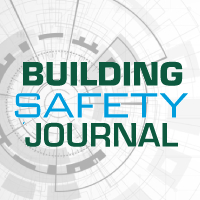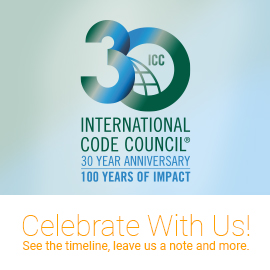
Master Code Professional Jerril Proffer
Jerril Proffer achieves the Master Code Professional designation, the gold standard of code certification
It’s considered the Ph.D. of building safety codes certification. The Master Code Professional (MCP) is the highest level of designation the International Code Council offers and is the “gold standard” for demonstrating proficiency in the code profession. The Code Council has certified thousands of individuals, but only a small select number have attained this high level of achievement: just over 800 MCP professionals worldwide. Their achievements are a benefit to the code enforcement profession as well as their communities.
To obtain this level of certification requires and demonstrates a commitment to the profession, diverse knowledge of codes and a high level of self-initiative. Jerril Proffer is the latest to join the elite group of Master Code Professionals. In this exclusive feature for the Building Safety Journal, we asked Jerril to share his experience on obtaining the MCP designation, highlights of his professional career and any insights or advice he has concerning the industry.
Jerril Proffer
Planner and Zoning Administrator
Campbell County, Wyoming
Gillette, Wyoming, United States
International Code Council member for 20+ years
Wyoming Conference of Building Officials
 BSJ: What led you to pursue and obtain MCP certification?
BSJ: What led you to pursue and obtain MCP certification?
Proffer: When I first entered the profession back in 1999, my goal was to obtain my CBO. I felt that if I could just make that milestone it would round out my career; however, once I received that certification, I saw the need to be better equipped to respond to situations that required a broader knowledge base. After being involved with so many different kinds of projects, both public and private, the MCP didn’t seem quite so far-fetched so I just kept studying as I had time.
BSJ: How did you study and prepare for the many exams you took as a part of your MCP designation?
Proffer: I spent a significant amount of time off-hours utilizing the study tools provided by the ICC, including the online study options. I was also very fortunate to have worked with skilled professionals such as professional engineers, master electricians, etc., who helped me along the way.
I was also blessed to have worked for agencies that saw the value in training and I was able to attend events like EduCode and other in-person venues and in a few instances go to privately operated training classes.
BSJ: What does achieving the prestigious MCP status mean to you?
Proffer: I have held every position within development service departments from building inspector to department director, so at this point in my career it is more of personal satisfaction than a tool to move up in any given organization. I think receiving my CBO certification was just as meaningful or maybe even more so.
BSJ: How would you describe the value or benefits that have come with the recognition of your MCP status?
Proffer: For me, the value comes in the practical application of the things I have learned and the ability that it has given me to discuss almost any topic that may come up on any project. I feel confident whenever I am interacting with design professionals, developers, and other stakeholders.
BSJ: What advice would you offer to those who are considering pursuing an MCP designation?
Proffer: I would encourage anyone in the profession to just quietly keep working on obtaining additional certifications. Establish working relationships with design professionals and tradesmen whom you trust so that you can discuss code requirements and understand how the codes affect the field personnel. We have to remember that those people who work in the field are experts in what they do and much of what is written in our code books came from their knowledge.
Additionally, working towards the MCP generally means that you are working towards a supervisor position. I encourage everyone who aspires to that level to reach out and understand how your department interacts with other departments, agencies, and individuals. Establish good working relationships in an effort to reach common goals.
BSJ: How long have you been in the industry?
Proffer: Twenty-three years.
BSJ: What major changes have you seen?
Proffer: I started out under the BOCA Code (Building Officials and Code Administrators International) — being a part of the transition to the I-Codes was the most significant and beneficial change that I have seen. From a technical aspect, it is the variety of building materials that are now available. It is a challenge to keep abreast.
BSJ: What excites you about the future of your industry?
Proffer: The career field continues to expand, and there are a lot of great opportunities for anyone considering entering the profession.
BSJ: What is one piece of advice that you would give to those starting out in the industry?
Proffer: Be teachable. Being teachable also means being relational and willing to adapt, relent, and rethink your position. None of us knows everything, and learning never stops.
BSJ: Building safety is the focal point of our mission here at the Code Council. What is the importance of building safety to you? How has ICC helped you in your career and commitment to public safety?
Proffer: Distinguishing between major issues vs. minor issues is key. Knowing when to actually ‘enforce’ a code provision knowing that you are protecting both the occupants and/or our first responders is invaluable and satisfying.
BSJ: Obtaining all those ICC certifications is quite an accomplishment. What are you going to do now that you have achieved this goal?
Proffer: I am also an ASFPM Certified Floodplain Manager and a CALBO Safety Assessment Program Evaluator for post-disaster work. In my current position, I will probably start working on becoming an AICP Certified Planner.
Last of all, I have never completed my bachelor’s degree in Public Administration, so that is something I might still work on. With that background, I may still work towards ending my career as either a city or county manager.
BSJ: Thank you, Jerril, and congratulations. You have definitely been an encouragement to us all in your pursuit of excellence.
To earn the Code Council’s elite MCP designation, a candidate must first pass 10 core Code Council exams plus a number of elective Code Council exams. Typical Master Code Professionals hold 17 or more Code Council certifications. The Master Code Professional designation requires certified individuals to complete an additional 60 hours of Continuing Education Units every three years to maintain active status.
“The Master Code Professional certification is the pinnacle of all Code Council certifications, representing a level of effort, knowledge, and dedication that elevates not only the individual achieving it but the code official profession as a whole,” said Code Council Chief Executive Officer Dominic Sims, CBO.
Master Code Professionals are typically responsible for all technical and management aspects of code enforcement with duties that range from the management of a code enforcement department to the supervision of inspectors and plan reviewers.
“Congratulations to Jerril on achieving this important and significant accomplishment,” said Autumn Saylor, Director of the Code Council’s Assessment Center. “I challenge and encourage all code professionals to strive for this level of achievement, and look forward to congratulating more Master Code Professionals in the future.”
To learn more on how you can join this elite group and let us help you open the door to increased professional challenges and career advancement, click here.





